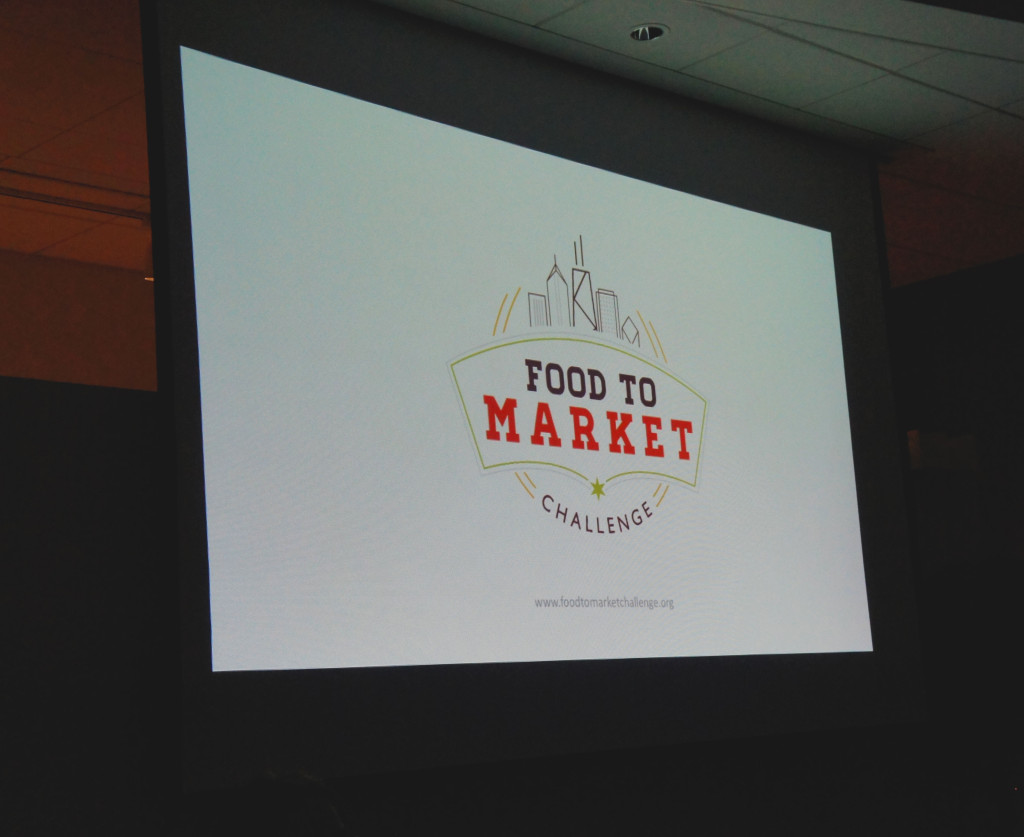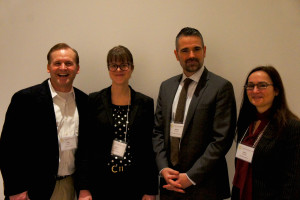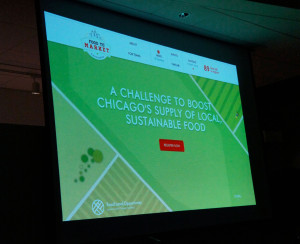By Bob Benenson, FamilyFarmed
Consumer demand for locally and sustainably produced food has grown dramatically in recent years. But continued expansion of this Good Food market is challenged by problems in the supply chain: the logistical and marketing issues that make it difficult for local and regional farmers and food processors — most of them small to medium-sized producers — to sell their product into local and regional markets dominated by “Big Ag” and “Big Food.”
Many nonprofit organizations, including FamilyFarmed, and for-profit companies have worked for years to untie the knots in the supply chain for local and sustainable food in the foodshed serving Chicago, the nation’s third most populous consumer market.
Now the effort is getting a big boost from the Food to Market Challenge, a newly launched competition that will bestow a $500,000 award on the team that “can conceive the most innovative solution to what we see as one of the biggest barriers to local and sustainable farming,” said Renee Michaels, vice president of Chicago’s Kinship Foundation, at the Jan. 27 Chicago event launching the competition and its Web platform.

The Food to Market Challenge logo was projected at a Chicago event held Jan. 27 to launch the project.
The Food to Market Challenge is a project of Food:Land:Opportunity — Localizing the Chicago Foodshed, a joint effort of The Kinship Foundation and The Chicago Community Trust that is funded by the Searle Funds at The Chicago Community Trust. “As partners in this work, we’re committed to a vision of the Chicago region becoming a national leader in the local food movement,” Michaels said.

The Food to Market Challenge competition for solutions to Good Food supply chain issues is led by (left to right) Jaison Morgan of Common Pool, which has run numerous innovation contests; Sarah Knobloch of The Kinship Foundation; Michael Davidson of The Chicago Community Trust; and Renee Michaels of The Kinship Foundation.
Michaels said that, since its inception in 2014, Food:Land:Opportunity has funded innovative projects that aim to increase the supply of local and sustainable food for consumers in the Chicago region.
She noted that these include FamilyFarmed’s Good Food Business Accelerator, which works to expand the market for locally and sustainably produced food in the Chicago region by providing instruction, technical assistance, mentoring and networking opportunities to competitively selected food and farm entrepreneurs.
She noted that the Chicago foodshed is a $14 billion market for fruits and vegetables, but only 5 percent of that food is grown within the region (most of the farmland in Illinois and nearby states is consigned to growing field corn and soybeans used for animal feed and biofuels).
“We live in one of the most fertile regions of the world, and yet we are not producing food for the 9 million people who live here,” Michaels said, adding, “For years now, we’ve seen a growing demand for transparency about how and where the food we eat is produced.”

The Food to Market Challenge homepage, projected at the Jan. 27 event, provides a link to the contest’s registration form.
Common Pool, a company based in Santa Monica, California, that has staged numerous innovation-driven contests, has built the online platform and is managing the competition. The specific goal is to develop a solution to supply chain issues affecting the Chicago metropolitan area and the local farms that service it, but the ideas generated in the course of the contest could have national impact as well.
Registration for the competition is open and may be submitted on the Food to Market Challenge website by the deadline of 10 a.m. central time on April 26. Michael Davidson of The Chicago Community Trust outlined the main rules for the competition.
• Your Kind of Town. As noted earlier, the Food to Market Challenge aims to present a solution or solutions to supply chain issues affecting the Chicago foodshed. Farmers involved in the competition must be located within a 250-mile radius of the city of Chicago, and proposed solutions must serve the immediate Chicago metropolitan area composed of Chicago, the rest of Cook County, and the counties of DuPage, Kane, Kendall, Lake, McHenry and Will.
• You Need a Local Farmer. One hard and fast requirement is that each of the competing teams must have at least one farmer who produces within the Chicago foodshed (and therefore deals with the local and regional supply chain). “We shouldn’t create a food solution without involving the person who grows the food,” Davidson said.
• A Local, Sustainable Farmer, That Is. “The farmer must also use sustainable production methods, that is growing operations characterized by diversified crop selection and management practices that enhance the biological stability of the organization,” Davidson emphasized. “Where applicable, soil management techniques that enhance the quality of soil over time and that have the potential to enhance the quality of natural ecosystems, and efficient and regenerative use of inputs and outputs such as water, energy and waste.”
• Anyone Else Can Play… As long as each team has a Chicagoland farmer on board, the competition is open to anyone who thinks he or she has a great idea for improving the food system. According to Davidson, “For-profit businesses can be on a team, as can nonprofits, government agencies, academics and entrepreneurs.”
• … But No Solo Acts. At least two organizations must collaborate on each team. The Challenge is conceived as a team effort in which individuals and organizations from various areas of expertise put their heads together to come up with the best solution. Even if an individual or single organization thinks it has the best concept ever, it will need to find a friend to work with.
And a local farmer, of course.
As explained by Jaison Morgan — the managing principal at Common Pool — during a phone interview prior to the event, the program is open to wide participation “in order to attract the broadest range of talent from a variety of disciplines, be it agriculture, marketing, transportation, technology, economics, finance or other fields.”
“We want to have active team members who know what it means to grow or sell food in the Chicago market,” said Morgan, “but we also want new talent and new ideas” from outsiders.
Morgan said that the size of the award is not the predominant factor is drawing competitors into contests such as this. Instead, most competitors want assurance that the process for selecting the winner or winners is transparent and fair, and perhaps more important, that they will benefit from the time and expense they put into creating a proposed solution even if they do not win.
Both he and Davidson underscored that the Food to Market Challenge and the online platform are designed to provide networking opportunities and to stimulate idea sharing among the teams.
Davidson put it this way at the rollout event: “So even though the Food to Market Challenge will produce a single winning solution, it’s structured to bring recognition and visibility to all the competitors. We’re expecting multiple good solutions to emerge from the Challenge, and we’re hoping that ultimately all of them get some traction in the marketplace.”
Morgan noted that the Food to Market Challenge will participate in FamilyFarmed’s 12th annual Good Food Festival & Conference, which is scheduled for March 24-26 in Chicago. Michaels will speak at the Opening Symposium on Friday, March 25, which is Trade/School Food/Producer/Policy Day, and Food to Market Challenge will hold a lunch reception that day to share details and provide answers to questions about the competition.
Morgan said he already has consulted with about 35 people with extensive experience in the Chicago food market as he worked to shape the parameters of the contest. Among them are Tom Spaulding, executive director of Angelic Organics Learning Center in Caledonia, Illinois, located about 85 miles northwest of Chicago; Kathy Baylis, an associate professor of Agricultural and Consumer Economics at University of Illinois at Champaign; and Karen Lehman, director of the Good Food funding cooperative Fresh Taste.
This project is something of a Chicago homecoming for Morgan. He studied for a master’s degree at University of Chicago from 1996 to 1999, then spent five years as an economics adviser to Chicago Mayor Richard M. Daley.
